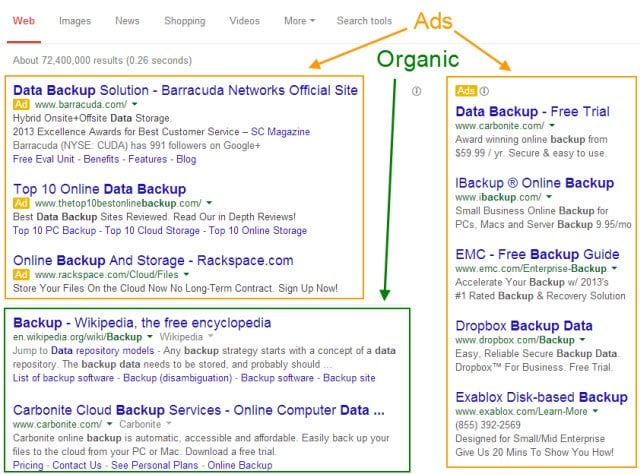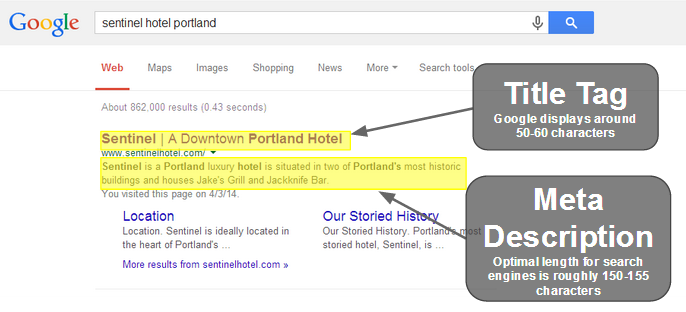Statistics show that 93% of online experiences begin with a search engine, and 75% of users never scroll past the first page of search results. So how do you get your website to show up on that covetable first Google search page?
Search Engine Optimization (SEO) helps search engines find sites. If you aren’t using SEO, then it’s likely search engines can’t find your website. That means customers can’t either.
What is SEO and how can it help increase search rankings?
Search engines like Google, Yahoo, Bing, and others “crawl” the web for information based on words users type in the search bar. The search engine determines which sites are the most relevant and provides a list of results. SEO “optimizes” your site’s ability to show up in those results.
Search engines take multiple factors into consideration and the algorithms are complex, but there are some simple Do-it-Yourself steps you can take to optimize your website. These basic practices will help you boost visibility online, increase search rankings, and more specifically, increase google rankings (since Google owns 65-70% of the search engine market share).
Note: SEO relates only to “organic search rankings.” This does not include paid advertising. The image below shows how paid ads and organic search results appear.

Basic SEO practices to increase search engine rankings
Get your free Google business listing
If you haven’t already, register your business with Google. This will ensure that your business shows up on Google Maps, Search, and other Google properties. No storefront? You can still list your business without an address to increase Google rankings.
Do some keyword research
Keyword research is the foundation of SEO strategy. Give some thought to keywords or phrases that are relevant to your business. What might potential customers type into the search bar? What keywords or phrases do you want your business to be found for? Try not to be too generic.
Let’s say, for example, that you own a landscaping business in Toledo, Ohio. It would be tough for the right customers to find you if they only used a simple search term like “landscaper.” They are more likely to search:
- landscapers in toledo ohio
- toledo landscapers
- lawn care in toledo ohio
- toledo lawn service
- landscaping in toledo
If you’re using a tool like Google Analytics, you can find out which keywords people are already searching to get to your site. You can also use Google’s Keyword Planner, but it does require you to have an AdWords account.
Understand metadata basics
If you work with an SEO-friendly content management system (CMS), like WordPress or the FreeLogoServices web builder tool, you’ll have control over key pieces of data on each web page, including:
- Title tags: This is the title displayed on search rankings. For SEO, it’s one of the most important pieces of information on the entire page.
- Meta descriptions: Though meta descriptions don’t impact search rankings, they’re still important. They are the brief descriptions of your site’s content that appear in search results, and they could be what convinces someone to click on your site!

- Image titles: Image titles are self-explanatory. They’re the title you give an image file when you save it. Always keep these relevant and brief.
- Alt text: This “tag” provides alternative info that helps explain what an image is. Alt text CAN help increase your Google search rankings, but only use keywords in alt text if it makes sense for the image.
Put your keywords/phrases to work
As search engines crawl the web, they keep track of search terms. SEO makes sure that your keywords appear in the right locations and work to increase search rankings. It’s just one of the ways search engines measure relevance.
Once you know what your keywords are, you’ll have an idea where they should fit throughout your website. Start with the pages that get the most traffic and work your way through. Don’t overuse keywords just for the sake of frequency. That’s called “keyword stuffing” and it can do more harm than good. Hubspot recommends placing your keywords in the following places:
- Title tag
- Meta descriptions
- Headings & page content
- Image titles & alt text
- URLs
Build backlinks
When other websites link to your site, a backlink, or external link is created. Search engines view these backlinks as votes of popularity. When a site that links to your page is trusted and has “authority,” your site gains credibility.
Building backlinks to increase search engine rankings – steps to get started:
- Build relationships with sites that have authority. The more relevant to your subject matter, the better. Look for opportunities within your industry like associations, related forums, business directories, etc. You could even create original content for those authoritative websites to secure backlinks from guest posts.
- Make asking for links a part of your regular networking. When it’s relevant, ask business contacts, vendor,s or partners. Do you use brand name products in your business? Write a positive online review of your supplier’s product and ask if they’d be willing to link back to your site when they publish it.
- Make publishing relevant and engaging content a habit. Starting a blog on your website is a terrific way to generate fresh content on a regular basis. Posts don’t have to be lengthy. Content can also be images or infographics that are relevant to your audience. Lacking ideas? Check out these inspirations for creating content.
- Share your content via social media sites. If you’re not already using Google+, sign up and start sharing your content. Pick other sites that would be a good fit. Which sites do your customers or potential customers spend time on? That’s where you want to be! Google+ may not be as popular as Facebook or Twitter, but it can help with SEO and increasing your Google search rankings.
- Grow your email list. If you don’t have one, start building. Email is a great channel for distributing your content and encouraging others to share it!
SEO isn’t a once and done project. To stay ahead of the competition and increase search engine rankings, make it an ongoing priority. Update and experiment with new keywords, keep learning and stay abreast of changes in SEO marketing because the algorithms are a moving target. We recommend following at least one SEO blog to sharpen your skills and stay up-to-date. A few blogs we like are:
Happy optimizing!
Looking to get your business online or boost traffic to your website? Take a look at our DIY website builder packages. They’re affordable and easy to use!



